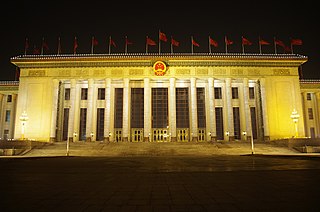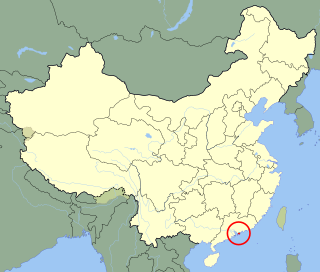Related Research Articles

The Treaty of Nanking was an unequal treaty between Great Britain and the Qing dynasty of China to end the First Opium War (1839–1842), signed on 29 August 1842.

In international law, extraterritoriality is the state of being exempted from the jurisdiction of local law, usually as the result of diplomatic negotiations.

The Sino-British Joint Declaration was a treaty between the governments of the United Kingdom and China signed in 1984 setting the conditions in which Hong Kong was transferred to Chinese control and for the governance of the territory after 1 July 1997.

The New Territories is one of the three main regions of Hong Kong, alongside Hong Kong Island and the Kowloon Peninsula. It makes up 86.2% of Hong Kong's territory, and contains around half of the population of Hong Kong. Historically, it is the region described in the Convention for the Extension of Hong Kong Territory. According to that treaty, the territories comprise the mainland area north of Boundary Street on the Kowloon Peninsula and south of the Sham Chun River, as well as over 200 outlying islands, including Lantau Island, Lamma Island, Cheung Chau, and Peng Chau in the territory of Hong Kong.

The Convention of Peking or First Convention of Peking is an agreement comprising three distinct unequal treaties concluded between the Qing dynasty of China and Great Britain, France, and the Russian Empire in 1860.

Hong Kong (1800s–1930s) oversaw the founding of the new crown colony of Hong Kong under the British Empire. After the First Opium War, the territory was ceded by the Qing Empire to the United Kingdom of Great Britain and Ireland through Treaty of Nanjing (1842) and Convention of Peking (1860) in perpetuity. Together with additional land that was leased to the British under the Convention for the Extension of Hong Kong Territory (1898), Hong Kong became one of the first parts of East Asia to undergo industrialisation.

New Kowloon is an area in Hong Kong, bounded to the south by Boundary Street, and to the north by the ranges of the Eagle's Nest, Beacon Hill, Lion Rock, Tate's Cairn and Kowloon Peak. It covers the present-day Kwun Tong District and Wong Tai Sin District, and northern parts of the Sham Shui Po District and Kowloon City District.
A private highway is a highway owned and operated for profit by private industry. Private highways are common in Asia and Europe; in addition, a few have been built in the United States on an experimental basis. Typically, private highways are built by companies that charge tolls for a period while the debt is retired, after which the highway is turned over to government control. This allows governments to fulfill immediate transportation needs despite their own budget constraints, while still retaining public ownership of the roads in the long term.

The territorial evolution of the British Empire is considered to have begun with the foundation of the English colonial empire in the late 16th century. Since then, many territories around the world have been under the control of the United Kingdom or its predecessor states. When the Kingdom of Great Britain was formed in 1707 by the union of the Kingdoms of Scotland and England, the latter country's colonial possessions passed to the new state. Similarly, when Great Britain was united with the Kingdom of Ireland in 1801 to form the United Kingdom, control over its colonial possessions passed to the latter state. Collectively, these territories are referred to as the British Empire. When much of Ireland gained independence in 1922 as the Irish Free State, the other territories of the empire remained under the control of the United Kingdom.

The handover of Hong Kong from the United Kingdom to the People's Republic of China was at midnight on 1 July 1997. This event ended 156 years of British rule in the former colony, which began in 1841.

This article concerns the history of British nationality law.

Belgium controlled several territories and concessions during the colonial era, principally the Belgian Congo from 1908 to 1960, Ruanda-Urundi from 1922 to 1962, and Lado Enclave from 1884 to 1910. It also had small concessions in Guatemala (1843–1854) and Belgian concession of Tianjin in China (1902–1931) and was a co-administrator of the Tangier International Zone in Morocco.
In international relations, a concession is a "synallagmatic act by which a State transfers the exercise of rights or functions proper to itself to a foreign private test which, in turn, participates in the performance of public functions and thus gains a privileged position vis-a-vis other private law subjects within the jurisdiction of the State concerned." International concessions are not defined in international law and do not generally fall under it. Rather, they are governed by the municipal law of the conceding state. There may, however, be a law of succession for such concessions, whereby the concession is continued even when the conceding state ceases to exist.

The Convention between the United Kingdom and China, Respecting an Extension of Hong Kong Territory, commonly known as the Convention for the Extension of Hong Kong Territory or the Second Convention of Peking, was a lease and unequal treaty signed between Qing China and the United Kingdom in Peking on 9 June 1898, leasing to the United Kingdom for 99 years, at no charge, the New Territories and northern Kowloon, including 235 islands.
A reception statute is a statutory law adopted as a former British colony becomes independent by which the new nation adopts, or receives, the English common law before its independence to the extent not explicitly rejected by the legislative body or constitution of the new nation. Reception statutes generally consider the English common law dating prior to independence, as well as the precedents originating from it, as the default law because of the importance of using an extensive and predictable body of law to govern the conduct of citizens and businesses in a new state.

Hong Kong was a colony and later a dependent territory of the United Kingdom from 1841 to 1997, apart from a period of Japanese occupation from 1941 to 1945 during the Pacific War. The colonial period began with the British occupation of Hong Kong Island in 1841, during the First Opium War between the British and the Qing dynasty. The Qing had wanted to enforce its prohibition of opium importation within the dynasty that was being exported mostly from British India and was causing widespread addiction among the populace.
Government rent in Hong Kong started on July 1, 1997, with the inception of the Joint Declaration. It said that new land grants contain a standard condition that the lessee is required to pay an annual rent, equal to 3% of the rateable value from time to time of the land leased.

Hong Kong–United Kingdom relations are the international relations between the post-colonial Hong Kong and the United Kingdom. Hong Kong was a British colony from 1841 to 1941 and again from 1945 to 1997 when sovereignty was handed over to China. UK policy towards Hong Kong is underpinned by its substantial commercial interests, and fulfilling obligation as the other signatory of Sino–British Joint Declaration on the future of Hong Kong, in addition to support Hong Kong's mini-constitution, the Basic Law, and in accordance with China's policy of observing "one country, two systems". Hong Kong is also home to roughly 2.9 million British nationals, 350,000 of which hold an active British passport, giving it one of the largest populations of British passport holders in the world behind only the Anglosphere Commonwealth realms and the United States.

The Six-Day War was a brief war fought between the British Empire and several punti clans of the New Territories in Hong Kong from 14–19 April 1899. Several punti clan leaders were opposed to the British takeover of the New Territories, which had been approved by the Qing dynasty via the Second Convention of Peking. Fearing the loss of their traditional land rights, a force of 2,600 militiamen attacked nearby British forces before being quickly beaten back, suffering 500 dead in the process. Governor Henry Arthur Blake took a conciliatory stance towards the punti clans, agreeing to acknowledge their land rights, which continue to be recognised into the present day.

Hong Kong–mainland China relations refer to the relationship between Mainland China and Hong Kong. According to the 1997 Sino-British Joint Declaration, the United Kingdom handed control of Hong Kong over to the People's Republic of China, making it a special administrative region. In principle, Hong Kong became an autonomous administrative division based on the Hong Kong Basic Law.
References
- ↑ Mortgage News Daily web site article on a 99-year lease Archived 3 March 2008 at the Wayback Machine . Accessed 20 February 2008.
- ↑ Cecil Adams, Why are leases made for 99-year terms?, 22 July 1977, found at The Straight Dope article on 99-year lease. Accessed 20 February 2008.
- ↑ William Blackstone (1753), Commentaries on the Laws of England , Book 2, Chapter IX "Of estates less than freehold"
- ↑ Taylor, Gordon (4 July 2016). "Can people own land in the ACT?". Australian Broadcasting Corporation. Retrieved 24 July 2018.
- ↑ Williams, David O. (28 July 2023). "Oil-train opponents look to railroad's expiring Moffat Tunnel lease for bargaining power". Colorado Newsline. Retrieved 26 September 2023.